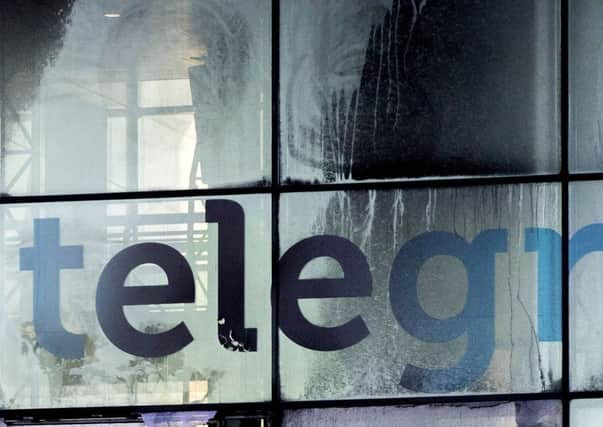Journalism can be a life-threatening business '“ John McLellan


The Amsterdam HQ of the Netherlands’ biggest newspaper, De Telegraaf, is a typical corporate place, a short train journey from the city centre, on a business estate, with lots of glass, an airy atrium, and the title logo in six-foot high letters on the wall facing the main road.
I was there on Thursday for a meeting of the World Association of Newspapers (WAN) as part of the preparations to bring its annual News Media Congress and World Editors’ Forum to the Scottish Exhibition Centre in Glasgow on 1 to 3 June. With around 800 international publishers and senior editors expected, it’s one of the biggest events in the industry calendar and puts Glasgow firmly on the world news map.
Advertisement
Hide AdAdvertisement
Hide AdIt wasn’t the best day to ask me over to speak, clashing as it did with Edinburgh Council’s full meeting, but as I’m helping coordinate the event it couldn’t be helped. They weren’t to know that on the Wednesday Scottish Finance Secretary Derek MacKay was delivering his budget and it really was most inconsiderate of my Conservative colleagues in Westminster to try to unseat the Prime Minister just as the plane was taking off.
Nor could the WAN team have known their meeting would be the same day as the funeral of my old colleague, the irascible Evening News columnist John Gibson, but John would have appreciated the drinks on the canal boat on the way to the board dinner at the Grachtenuis Museum.
At De Telegraaf’s entrance, extensive work was being done to replace ground-to-roof plate glass, which was a bit inconvenient but no hardship. It turned out this was no ordinary refurb, but replacing windows shattered by a car bomb attack a couple of months ago by organised by criminals threatened by the paper’s investigations. Fortunately, it happened in the early hours of the morning and no-one was hurt.
It had echoes of the 1996 gangland killing of Irish investigative journalist Veronica Guerin and also the attack here three years ago when crime reporter Russell Findlay had acid thrown in his face at home by a hoodlum in the pay of Glasgow gangsters who didn’t like what he’d been writing.
It was a stark reminder that good journalism can be a dangerous business, and that news reporting isn’t just another way of making money. It matters enough that some people are prepared to kill and maim to stop it.
Politics of advertising Lawful threats to the news industry, particularly the impact of tech giants like Google and Facebook, pose far greater dangers than any criminal could dream up.
Long before David Cameron thought an EU referendum was a good idea, the news industry has been wrestling with the conundrum that startling success in expanding readership was being rewarded with an equally dramatic slump in revenue. As a senior advertising executive put it recently, it must be the only business with more customers than ever but which is making less money.
It’s easy to accuse news publishers of self-interest in arguing that a healthy, independent and trusted news sector is essential not just for democratic accountability but for good business too. But the adverse effect of millions of pounds in advertising revenue being siphoned off by Google and Facebook is now being felt not just by news organisations, but the wider advertising and marketing community too. Despite an assumption that advertising agencies were still doing nicely because all they had to do was switch from traditional media to programmatic campaigns on social media platforms to keep scooping up the fees.
Advertisement
Hide AdAdvertisement
Hide AdBut as bookings are sucked into fewer channels, fees have begun to fall which has in turn hit the system which finances the Advertising Standards Authority. Funded by advertisers, the ASA costs the tax-payer nothing, so if nothing is done to block the drain, the Government could be asked to step in, with all the implications of political interference with freedom of expression that entails.
The work the ASA does was illustrated this week with new guidelines to outlaw gender stereotyping, so no dumb dads fumbling with nappies or ditsy girlies struggling to park and off to the advertising museum goes the Oxo mum. Who would have thought this system could be threatened by people sharing pictures of their dinner and their pearls of wisdom on Facebook?
Impressive But some cheer for the Scottish industry this week with the launch of this year’s Scottish Press Awards programme. Recognition of the contribution that good, independent journalism makes to Scotland came with the announcement of a raft of new sponsors, including Amazon, Scottish Water, People’s Postcode Lottery, the Law Society of Scotland, BT Openreach and Scotland Gas Networks. It’s a great vote of confidence in Scottish newspapers and Scottish journalism.
These Bayern ‘fans’ seem clean-living Even for a major tourism destination, a late Wednesday night flight to Amsterdam in December would not be a cause for concern. This week, however, amidst the short-break couples and a handful of people on business were large groups of males clearly intent on having a good time. And from the loud marching flute music immediately behind me, it could safely be assumed these were Rangers supporters on their way to Vienna for Thursday’s Europa League match.
On arriving at my hotel, there were one or two men in Bayern Munich kit so again it was a fair assumption they were in town for their team’s game against Ajax, and given it was a 3-3 thriller they were remarkably quiet and the bar was empty. I mused that if they were Rangers supporters, the bar staff would have been a bit busier.
The Bayern boys were up sharp the next day, looking fresh. No, these were definitely not typical football fans and in fact it turned out they were far from being ordinary supporters. It was the team.